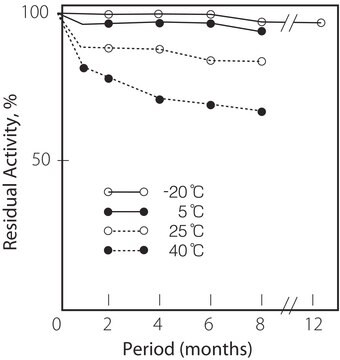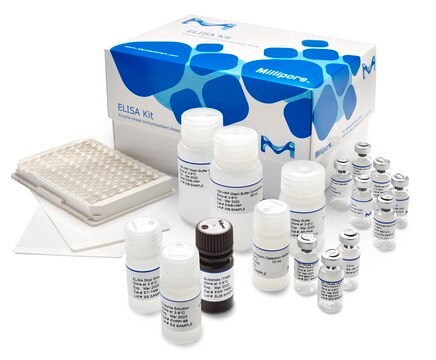C8743
Cholesterol Dehydrogenase from Nocardia sp.
Se connecterpour consulter vos tarifs contractuels et ceux de votre entreprise/organisme
About This Item
Numéro CAS:
Numéro de classification (Commission des enzymes):
1.1.1.B40
Code UNSPSC :
12352204
Nomenclature NACRES :
NA.54
Produits recommandés
Produit recombinant
expressed in Streptomyces lividans
Forme
lyophilized solid
Activité spécifique
≥18 unit/mg solid
Poids mol.
~37 kDa by SDS-PAGE
Température de stockage
−20°C
Application
The enzyme sequence is derived from Nocardia sp., and this cholesterol dehydrogenase is expressed in Streptomyces lividans. Cholesterol Dehydrogenase from Nocardia sp. has been used in the preparation of amperometric cholesterol biosensor for cholesterol detection in biological samples and in a study to investigate the atomic structure of the autosomal recessive hypercholesterolemia phosphotyrosine-binding domain with the LDL-receptor tail. Cholesterol dehydrogenase from Nocardia sp. Has also been used in a study to assess organization, dynamics, and segregation of Ras nanoclusters in membrane domains.
Enzyme used in determining cholesterol in serum
Actions biochimiques/physiologiques
Cholesterol dehydrogenase (CDH) is a nicotinamide adenine dinucleotide phosphate (NAD(P)) dependent microbial dehydrogenase that oxidizes the 3-β-hydroxyl group of cholesterol to yield cholest-4-ene-3-one. Cholesterol detection by using CDH allows direct and easier quantification compared to cholesterol oxidase based assay.
Cholesterol dehydrogenase is a NAD(P) dependent microbial dehydrogenase that oxidizes the 3-β-hydroxyl group of cholesterol to yield cholest-4-ene-3-one. Molecular mass of the protein is found to be 37 kDa based on SDS-PAGE. Its pH is 4.5.
Définition de l'unité
One unit produces 1.0 μmole of cholesten-4-en-3-one per minute at pH 8.5 at 25 °C.
Forme physique
Supplied as a lyophilized powder
Mention d'avertissement
Danger
Mentions de danger
Conseils de prudence
Classification des risques
Resp. Sens. 1
Code de la classe de stockage
11 - Combustible Solids
Classe de danger pour l'eau (WGK)
WGK 3
Point d'éclair (°F)
Not applicable
Point d'éclair (°C)
Not applicable
Équipement de protection individuelle
Eyeshields, Gloves, type N95 (US)
Certificats d'analyse (COA)
Recherchez un Certificats d'analyse (COA) en saisissant le numéro de lot du produit. Les numéros de lot figurent sur l'étiquette du produit après les mots "Lot" ou "Batch".
Déjà en possession de ce produit ?
Retrouvez la documentation relative aux produits que vous avez récemment achetés dans la Bibliothèque de documents.
Lorant Janosi et al.
Proceedings of the National Academy of Sciences of the United States of America, 109(21), 8097-8102 (2012-05-09)
Recent experiments have shown that membrane-bound Ras proteins form transient, nanoscale signaling platforms that play a crucial role in high-fidelity signal transmission. However, a detailed characterization of these dynamic proteolipid substructures by high-resolution experimental techniques remains elusive. Here we use
Takeshi Nomura et al.
Proceedings of the National Academy of Sciences of the United States of America, 109(22), 8770-8775 (2012-05-16)
Mechanosensitive (MS) channels of small (MscS) and large (MscL) conductance are the major players in the protection of bacterial cells against hypoosmotic shock. Although a great deal is known about structure and function of these channels, much less is known
Hay Dvir et al.
Proceedings of the National Academy of Sciences of the United States of America, 109(18), 6916-6921 (2012-04-18)
Hypercholesterolemia, high serum cholesterol in the form of LDL, is a major risk factor for atherosclerosis. LDL is mostly degraded in the liver after its cellular internalization with the LDL receptor (LDLR). This clathrin-mediated endocytosis depends on the protein autosomal
Notre équipe de scientifiques dispose d'une expérience dans tous les secteurs de la recherche, notamment en sciences de la vie, science des matériaux, synthèse chimique, chromatographie, analyse et dans de nombreux autres domaines..
Contacter notre Service technique






